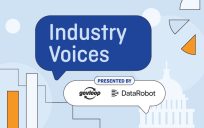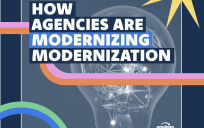 In a recent survey, government employees said they were looking forward to learning more about working with AI. The Government Business Council survey, sponsored by our company, showed that respondents were receptive to learning about and using new intelligent technologies such as artificial intelligence (AI) and they welcome opportunities to build their skill sets.
In a recent survey, government employees said they were looking forward to learning more about working with AI. The Government Business Council survey, sponsored by our company, showed that respondents were receptive to learning about and using new intelligent technologies such as artificial intelligence (AI) and they welcome opportunities to build their skill sets.
It’s great news that employees feel the excitement and want to dive in and learn more. However, we believe agencies need to think about how they approach integrating the workforce and AI earlier in the process and bring them along on the journey. Here’s how it might be done:
Co-create the vision
By putting together an AI approach that includes the workforce, people become part of envisioning and ultimately adopting the solution. Sometimes employees see technology acquired and “bolted on” to fix a problem, and they don’t understand the big picture or what that technology is trying to solve.
Questions that often arise are: will it make my job easier? Will it help me focus on other higher value parts of my work? By having a multi-year AI vision that is co-created with employees who best understand the work, the technology is more likely to gain acceptance, and employees better understand how it will impact or amplify their work and role. As an added bonus, you’ll create awareness among the workforce and identify some early adopters who are involved from the beginning.
Understand the work
AI adoption should be pursued in the context of shifting employees from low-value to high-value work. Teams that are augmented or given the opportunity to work with intelligent technologies are likely going to become the norm. Employees are the contextual experts and can define the tasks that best lend themselves as AI candidates. By using a design-led approach, employees can identify the tasks AI can do, and that will help them do their jobs more efficiently and also reinforce their trust in the solution.
Don’t underestimate the role of change management and training
While there is a significant appetite for continued education around the opportunities that intelligent technologies like AI present to federal employees, the workforce also believes that AI will benefit them individually in their roles. Our survey shows that federal workers understand that AI will create opportunities for them to continue to grow their skills and develop their career. Contrary to that, the survey also found that 73 percent of respondents said their agency’s leaders could do more to communicate a long-term vision for what AI will mean for their workplace. Agencies should take the opportunity now to address this disconnect before the void is filled with assumptions that are not grounded in fact.
Enter: Change management and training. Employees need to know what to expect when it comes to AI and their job, their team and their work. Communication should begin early and happen often. Employees also want training on AI but are unsure of what that really means. They want to be knowledgeable about what AI will do, what the technologies are and the new ways of working with it, thereby identifying how they individually will interact with it.
The answers could come through ongoing educational bite-size learning versus a longer 3-4 day AI skills training course. Softer skills training allows the employee to see how work will be changing as AI is introduced, what skills will become important to hone when interacting with AI, and how can they learn about the opportunities being explored at their Agency. Take the time to develop a communications plan, messaging, and governance structure that creates an informed workforce around AI.
Bottom line: AI is coming, and it’s time to put the employee at the center of the planning.
Co-authored by Kristen Vaughan, managing director and Human Capital Practice lead and Britaini Carroll, Human Capital Practice workforce lead.
Dominic Delmolino is a GovLoop Featured Contributor. He is the Chief Technology Officer at Accenture Federal Services and leads the development of Accenture federal’s technology strategy. He has been instrumental in establishing Accenture’s federal activities in the open source space and has played a key role in the business by fostering and facilitating federal communities of practice for cloud, DevOps, artificial intelligence and blockchain. You can read his posts here.





Leave a Reply
You must be logged in to post a comment.